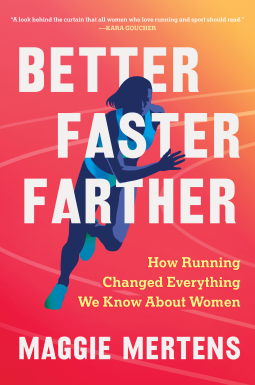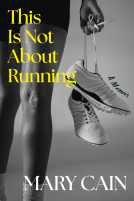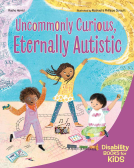
Better Faster Farther
How Running Changed Everything We Know About Women
by Maggie Mertens
This title was previously available on NetGalley and is now archived.
Send NetGalley books directly to your Kindle or Kindle app
1
To read on a Kindle or Kindle app, please add kindle@netgalley.com as an approved email address to receive files in your Amazon account. Click here for step-by-step instructions.
2
Also find your Kindle email address within your Amazon account, and enter it here.
Pub Date Jun 18 2024 | Archive Date Jun 19 2024
Talking about this book? Use #BetterFasterFarther #NetGalley. More hashtag tips!
Description
"A look behind the curtain that all women who love running and sport should read.” —KARA GOUCHER, Olympic runner and New York Times-bestselling author of The Longest Race
More than a century ago, a woman ran in the very first modern Olympic marathon. She just did it without permission. Award-winning journalist Maggie Mertens uncovers the story of how women broke into competitive running and how they are getting faster and fiercer every day—and changing our understanding of what is possible as they go.
Despite women proving their abilities on the track time and again, men in the medical establishment, media, and athletic associations have fought to keep women (or at least white women) fragile—and sometimes literally tried to push them out of the race (see Kathrine Switzer, Boston Marathon, 1967). Yet before there were running shoes for women, they ran barefoot or in nursing shoes. They ran without sports bras, which weren’t invented until 1977, or disguised as men. They faced down doctors who put them on bed rest and newspaper reports that said women collapsed if they ran a mere eight hundred meters, just two laps around the track. Still today, women face relentless attention to their bodies: Is she too strong, too masculine? Is she even really a woman?
Mertens transports us from that first boundary-breaking marathon in Greece, 1896, to the earliest “official” women’s races of the twentieth century to today’s most intense ultramarathons, in which women are setting all-out records, even against men. For readers of Good and Mad, Born to Run, and Fly Girls, Better Faster Farther takes us inside the lives and the victories of the women who have redefined society’s image of strength and power.
"An essential read to normalize women's existence, excellence, and humanity within the sport of running.” —ALISON MARIELLA DÉSIR
Available Editions
| EDITION | Other Format |
| ISBN | 9781643753355 |
| PRICE | $30.00 (USD) |
| PAGES | 304 |
Available on NetGalley
Average rating from 7 members
Featured Reviews
I had the opportunity to review “Better, Faster, Further” by Maggie Mertens, set to come out this summer. As a female athlete, this meant the world to me, and the book was so good!
Literature on female sports has started to gain traction lately, and it's so satisfying to see this field discussed, finally! Female sports have been the afterthought to the glorified male athletics since the beginning of time, and even though we've made a lot of progress in other areas of inequality, it seems to me that sports are behind in that regard. I've fought so many battles on my own as the women's captain of our competitive running club, and these books give me solace. Not only do they reassure that I'm not alone, but, more importantly, by being written, they are a major driver in the quest to change the situation for the better. It's almost as if these books take all the little individual efforts and wrap them up to deliver one big punch (or many) to jolt the field along to where it belongs. I'm really in tears from seeing so many women athletes stand up for their rights and those of their peers.
Mertens does this in a very meaningful and powerful way in the many chapters of the book, each dedicated to a specific topic holding us ladies back.
She starts out with a historical section on the exclusion of women in the Olympics in ancient Greece and then in their modern implementation. A lot of emphasis is placed on the early 20th century and the exclusion of women runners, first entirely, and then from longer distances. In this realm, the book also talks about race-based exclusion.
While sorting out this history, it's pretty maddening to read about the ridicule female runners are exposed to while male stars like Bannister and Prefontaine are glorified.
“Women runners, it feels like the stories tell us, are to be questioned, mythologized, accused, and most of all: doubted. Cut down to size. So that other women don’t get any ideas of what they might be capable of. How much of women’s selves, our capabilities, our strengths, our speeds, have we ignored, hidden away behind this veil of myth, over the years? How do we bring the truth to the forefront?”
The book talks about eating disorders, the apparent normalcy, or should that almost read the “requirement” of missing periods, the lack of research on female athlete physiology.
“when sufficient energy reserves become the focus of training—instead of an athlete’s body size, or shape, or even speed—performance, and injury-prevention, does improve. ‘When [athletes] realize that, oh wow, if I do eat better and I’m not afraid of carbs and I’m eating carbs at the right time and I’m having my recovery food and I’m getting more sleep, and I’m seeing these changes, they really buy into monitoring it.’”
The author reasons that there's a huge performance potential that lies within stopping to treat women as small men, based on many discussions with the rare researchers in female-specific sports.
“So many of the stories of well-known women runners are tragedies. Their bodies ravaged because they weren’t cared for or believed in in the same way as male athletes have always been. They’ve been told they need to shed their femininity in order to run fast like a boy, but also to hold on desperately to their femininity through thinness or conventional beauty in order to have any power in this world—because their athletic ability certainly won’t bring them that.”
The book also places a focus on the tragedy that has befallen transgender and intersex athletics and points out the potential human rights violation that arise from enforcing the newly implemented hormonal regulations.
“World Athletics, like nearly half of the states in the US, have decided it can say definitively what makes a man or a woman, even when science says we don’t know for sure. They’ve set in stone the idea that ‘data around physical performance’ shows ‘male advantage.’ This is just the way things work. Men are just always going to win. But what if they’re wrong?”
The end of the book briefly discusses ultrarunning and the closing of the gender gap that is seen in longer distances. As an ultrarunner, I loved seeing this chapter even though it was a little short. It beautifully ties up the story arc though by pointing out that women often even outperform men in these longer races because of their ability to recover more quickly.
I urge you to read this book if you're at all interested in sports. It's a fairly academic read, the text is pretty expository, so it took me a little while to get through it, but the payoff was dramatic because the book didn't just fuel my rage as so many works of nonfiction do, but it really also gave me hope because it shows how many other women out there are fighting alongside myself and those that I know. Thank you Maggie Mertens 🥹.
“What if we stopped seeing women athletes as definitively inferior to men? What if we celebrated the diversity of women athletes’ bodies, including the outliers, the same way we celebrate the diversity of men athletes’ bodies—especially the outliers?”
Thank you Netgalley and Algonquin Books!
 Julie A, Librarian
Julie A, Librarian
Very interesting! Who knew this was my jam! I have read a few books on running and hiking, and of course feminism and gender studies are always interesting. I read this book in a couple days and couldn't wait to tell people about it.. It's very readable and yet is obviously well-researched.
There's a section on race, and another on trans and intersex concerns in running. The latter of which was more horrible than I previously knew. You shouldn't be surprised by forced surgeries, and yet given it's the 21st century, it seems like we should be.
I wish more time had been spent on the ultramarathoners. I was looking forward to that section, and then it seemed short.
It could've also benefited from a chapter on para athletes. They're given passing mention in a list of who runs marathons these days, but no more details than that. I would love to know how blind athletes or those with running blades fare compared to their male counterparts.
Anyone interested in the sport of running or gender studies should add this to their personal library.
Readers who liked this book also liked:
Publishers Lunch
General Fiction (Adult), Nonfiction (Adult), Teens & YA
We Are Bookish
LGBTQIAP+, Romance, Sci Fi & Fantasy
Rasha Hamid
Children's Fiction, Health, Mind & Body, OwnVoices


















